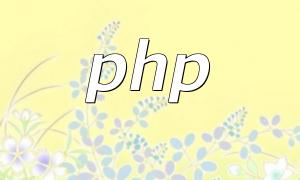In modern web development, JSON (JavaScript Object Notation) has become the preferred format for data transmission between the front-end and back-end. Due to its lightweight nature and ease of parsing, JSON is widely used in API design and asynchronous communication. In PHP, mastering JSON and its callback handling can significantly improve development efficiency and user experience.
A JSON callback is a method of accessing server-side data via a callback function, commonly used during asynchronous front-end requests (like AJAX). The server formats the response in JSON, and the client handles it through a callback function. In cross-domain scenarios, this technique is often implemented using JSONP.
In PHP, returning a JSON response usually involves setting the correct HTTP headers and using the json_encode function to structure the data. Here's an example:
// Set the response header to indicate JSON format
header('Content-Type: application/json');
// Create an array with the response data
$data = array(
'status' => 'success',
'message' => 'Data processed successfully!',
'data' => array(
'id' => 1,
'name' => 'John Doe'
)
);
// Convert the array to JSON
$json_data = json_encode($data);
// Output the JSON data
echo $json_data;This code demonstrates how to generate and return JSON data in PHP. The header function sets the correct content type, and json_encode transforms the array into a JSON string.
JSON callbacks not only simplify front-end data handling but also offer multiple benefits:
Compared to XML, JSON is more compact, requires less bandwidth, and is faster to parse—ideal for mobile or real-time applications.
In JavaScript, JSON can be parsed directly with JSON.parse(), streamlining the data handling process and letting developers focus on business logic.
JSON is widely supported across modern programming languages, making it highly flexible for front-end/back-end data exchange.
When your front-end and back-end are hosted on different domains, AJAX requests may be blocked due to the same-origin policy. JSONP circumvents this by dynamically creating a tag is created dynamically to call this script, with yourFunction being the callback defined in JavaScript.
This article covered how to return standard JSON responses and implement JSONP callbacks in PHP. These techniques are essential in modern web development, especially when dealing with asynchronous communication, cross-domain requests, and API design. Mastering JSON handling can greatly improve system performance and user interactivity.
If you're working on an API or optimizing client-server interaction, try incorporating these JSON techniques to deliver a smoother user experience.









